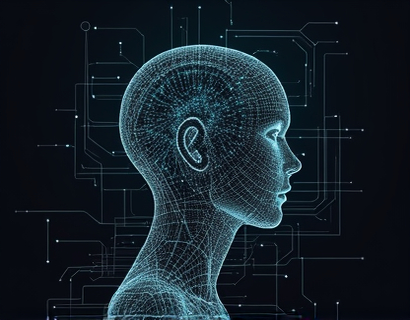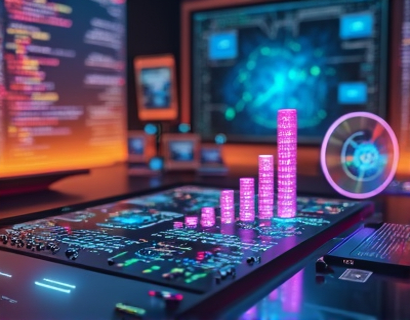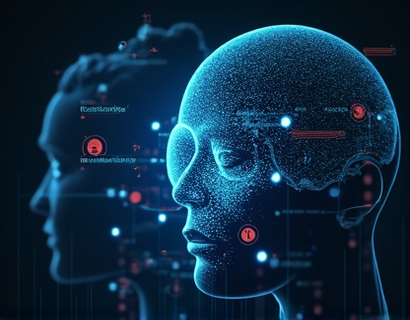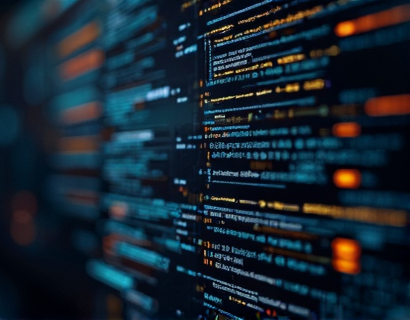AI and Crypto Convergence: Pioneering Intelligent Blockchain Finance Innovations
The intersection of artificial intelligence and cryptocurrency is giving birth to a new era of financial technology, one that promises to revolutionize the way we think about money, transactions, and security. This article delves into the dynamic synergy between these two transformative fields, offering a comprehensive guide for tech enthusiasts and professionals. By exploring expert insights, essential resources, and the vibrant community surrounding this convergence, we aim to provide a clear understanding of the innovations shaping the future of finance and tech.
Understanding the Basics
To grasp the convergence of AI and crypto, it's essential to first understand the fundamentals of both technologies. Artificial intelligence, a branch of computer science, focuses on creating systems that can perform tasks requiring human intelligence, such as learning, reasoning, and problem-solving. Machine learning, a subset of AI, enables systems to improve their performance based on data without being explicitly programmed.
Cryptocurrency, on the other hand, is a digital or virtual currency that uses cryptography for security and operates on a decentralized network, typically a blockchain. Blockchain technology ensures transparency, immutability, and security by recording transactions across multiple computers in such a way that the registered transactions cannot be altered retroactively.
The convergence of AI and cryptocurrency occurs where these technologies are integrated to enhance the functionality, security, and efficiency of blockchain-based systems. This integration opens up new possibilities for smart contracts, predictive analytics, and automated trading, among other applications.
Enhancing Smart Contracts with AI
Smart contracts are self-executing contracts with the terms of the agreement directly written into code. They run on blockchain networks and automatically enforce and execute the terms of the contract when predefined conditions are met. The integration of AI into smart contracts can significantly enhance their capabilities.
AI can be used to create more sophisticated and adaptive smart contracts. For instance, machine learning algorithms can analyze historical data and predict future trends, allowing smart contracts to make more informed decisions. This can be particularly useful in complex financial agreements where dynamic adjustments based on market conditions are necessary.
Moreover, AI can help in detecting and preventing fraudulent activities. By analyzing patterns and anomalies in transaction data, AI algorithms can identify potential fraud and trigger preventive measures within the smart contract. This adds an extra layer of security and trust to blockchain-based transactions.
AI-Driven Predictive Analytics in Crypto
One of the most exciting applications of AI in the crypto space is predictive analytics. Traditional financial markets rely heavily on historical data and technical analysis to forecast market trends. However, the decentralized and often chaotic nature of cryptocurrency markets presents unique challenges.
AI algorithms can process vast amounts of data from various sources, including social media sentiment, news articles, and market trends, to predict price movements with higher accuracy. These predictions can be invaluable for traders and investors looking to make informed decisions.
Furthermore, AI can help in risk management by identifying potential market shifts and providing alerts. This proactive approach can help investors mitigate risks and optimize their portfolios. The ability to analyze real-time data and adapt to changing market conditions is a significant advantage of AI in crypto finance.
Automated Trading and AI Bots
Automated trading, or algorithmic trading, involves using computer programs to execute trades based on predefined criteria. The integration of AI into trading bots takes this to the next level by enabling more intelligent and adaptive trading strategies.
AI-powered trading bots can analyze multiple data points simultaneously, including historical price data, market news, and social media sentiment. These bots can adjust their strategies in real-time, responding to market conditions more quickly and effectively than human traders.
Additionally, AI can help in managing emotions and biases that often affect human trading decisions. By sticking to predefined algorithms, AI bots can maintain a disciplined approach, reducing the impact of fear, greed, and other emotional factors that can lead to suboptimal trading decisions.
Security and AI
Security is a paramount concern in the crypto space, and AI plays a crucial role in enhancing the security of blockchain-based systems. Traditional security measures, such as firewalls and encryption, are essential but can be complemented by AI-driven solutions.
AI can be used to detect and respond to cyber threats in real-time. By analyzing patterns and anomalies in network traffic and transaction data, AI algorithms can identify potential security breaches and take immediate action to mitigate risks. This proactive approach to security is particularly important given the increasing sophistication of cyber attacks.
Furthermore, AI can help in verifying the authenticity of transactions and identifying fraudulent activities. Machine learning models can be trained to recognize legitimate patterns and flag any deviations, providing an additional layer of security for users and platforms.
The Role of AI in Decentralized Finance (DeFi)
Decentralized Finance, or DeFi, is a rapidly growing sector within the crypto ecosystem that aims to create financial services without traditional intermediaries. AI is playing a pivotal role in enhancing the functionality and accessibility of DeFi platforms.
One key area is in credit scoring and lending. Traditional credit scoring models rely on centralized data and can be biased or incomplete. AI algorithms can analyze a broader range of data points, including blockchain-based transaction history and social media activity, to provide more accurate and fair credit assessments.
AI can also optimize liquidity pools in decentralized exchanges, ensuring that assets are allocated efficiently to maximize returns for users. By analyzing market conditions and user behavior, AI can dynamically adjust the composition of liquidity pools, improving the overall performance of the platform.
Challenges and Considerations
While the convergence of AI and crypto offers numerous benefits, it also presents several challenges that need to be addressed. One of the primary concerns is the regulatory landscape. As AI and crypto continue to evolve, regulators are grappling with how to oversee these technologies to prevent misuse and ensure consumer protection.
Another challenge is the computational resources required for AI algorithms, particularly those involving deep learning. Blockchain networks, especially those using proof-of-work consensus mechanisms, can be energy-intensive. The combination of AI and crypto could exacerbate these energy concerns, necessitating the development of more efficient algorithms and consensus mechanisms.
Moreover, the complexity of AI models can make them less transparent and harder to audit. This lack of transparency can be a significant barrier in a regulatory environment that values clarity and accountability. Efforts to develop explainable AI (XAI) are crucial to address this issue and build trust among users and regulators.
Building a Vibrant Community
The convergence of AI and crypto is not just a technological endeavor but also a community-driven movement. A vibrant and inclusive community is essential for fostering innovation, sharing knowledge, and addressing challenges.
Online forums, social media groups, and dedicated platforms are emerging as hubs for enthusiasts and professionals to collaborate and exchange ideas. These communities provide valuable resources, including tutorials, research papers, and case studies, to help newcomers get started and advanced users stay updated on the latest developments.
Conferences, hackathons, and workshops are also playing a crucial role in bringing the community together. These events offer opportunities for networking, learning from experts, and showcasing projects. By participating in these activities, individuals can contribute to the growth and advancement of the field.
Conclusion
The convergence of AI and crypto is a powerful force driving innovation in finance and tech. By leveraging the strengths of both technologies, we can create more secure, efficient, and intelligent financial systems. As this field continues to evolve, it's essential to stay informed, engage with the community, and embrace the opportunities and challenges that lie ahead.
For those interested in delving deeper, numerous resources are available, including academic papers, online courses, and open-source projects. The future of AI and crypto is bright, and being part of this journey can lead to groundbreaking discoveries and transformative impact.











































